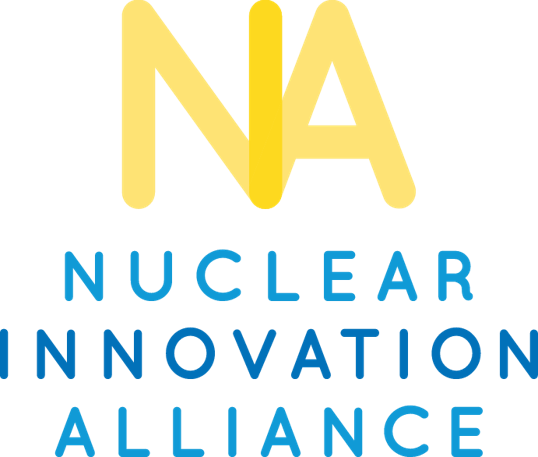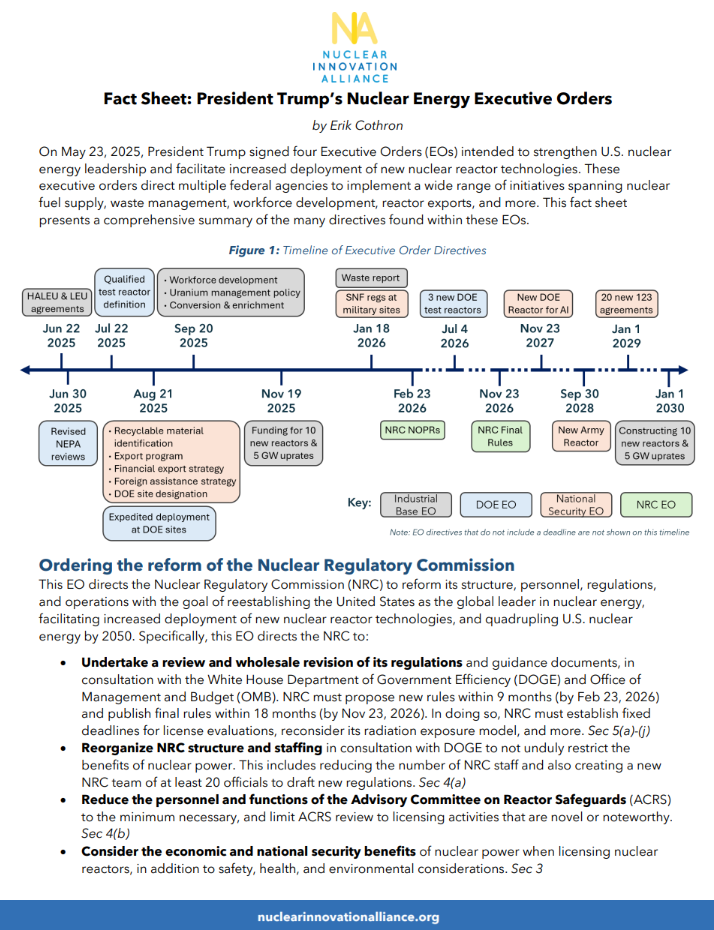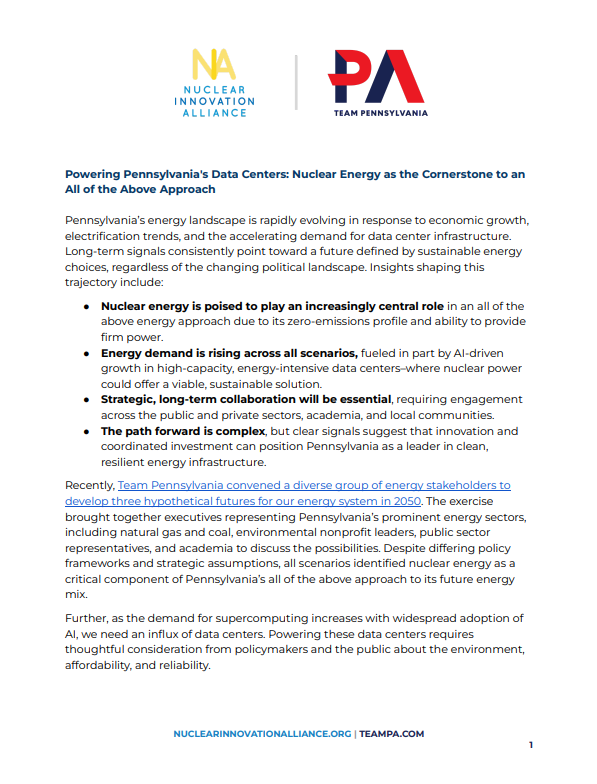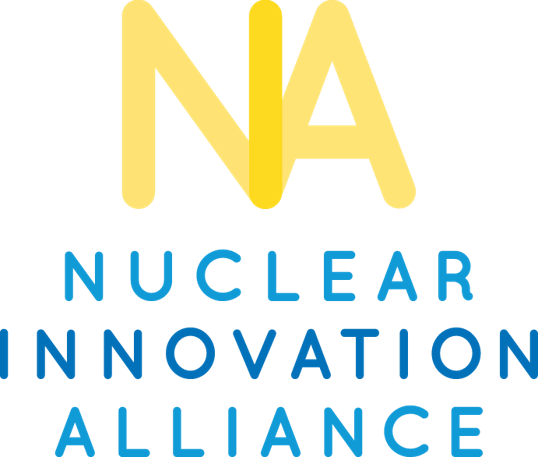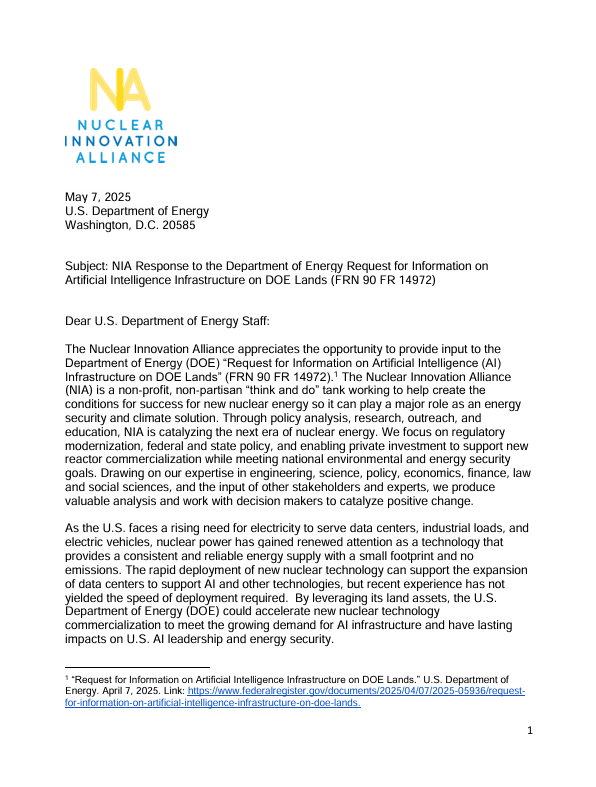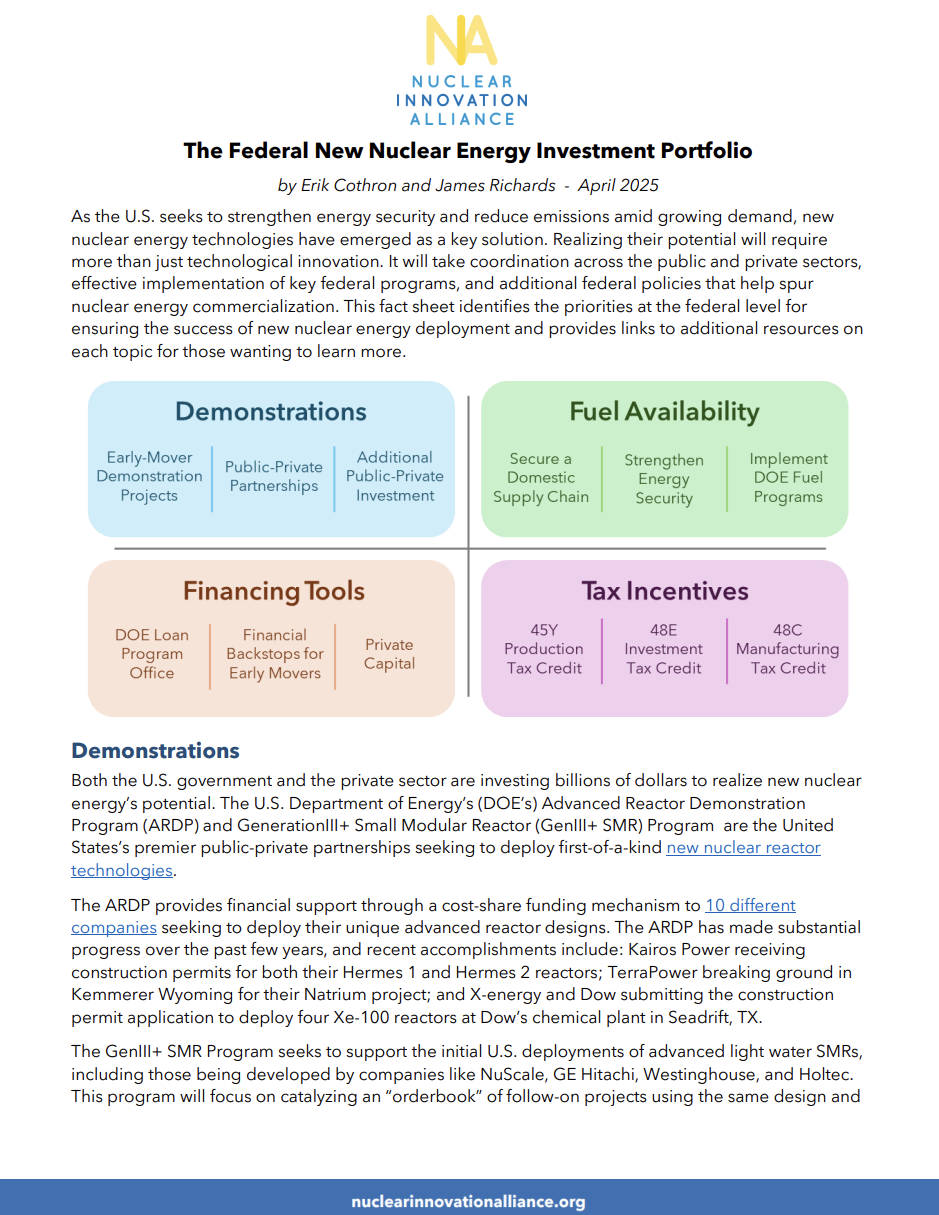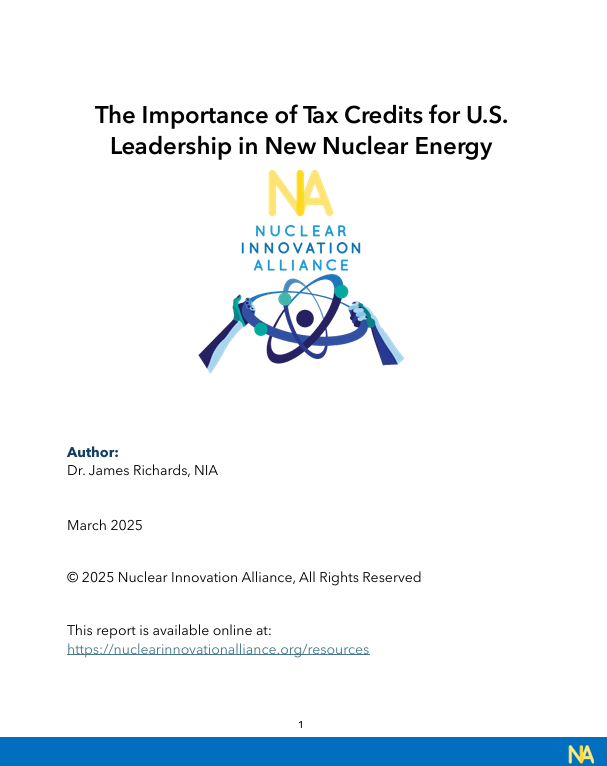In today’s episode of the USEA Power Sector Podcast series on power sector leaders, Nuclear Innovation Alliance President and CEO Judi Greenwald answered questions from journalist Herman K. Trabish about what the Alliance is, what it does, what it has accomplished, and what its current priorities are in support of new nuclear technologies.
This fact sheet presents a comprehensive, information-dense summary of every directive contained in these EOs to show what new programs, initiatives, and regulatory changes are included. It also cites the specific section of each executive order from which every directive originates. The goal of this fact sheet is to answer the questions: “What do these EOs actually do?”, “Which federal agencies are responsible for what”, and “When are specific actions scheduled to take place?”
To read NIA's op-ed that accompanies this fact sheet, click here
NIA and Team Pennsylvania collaborated to produce a paper that outlines different scenarios for powering data centers in Pennsylvania. The paper highlights the need for clean, firm power as a solution to power data centers and concludes that nuclear energy should be a cornerstone of Pennsylvania's energy future.
The Nuclear Innovation Alliance (NIA) is a non-profit think-and-do-tank working to enable nuclear power as a global solution to mitigate climate change. Through policy analysis, research, and education, we are catalyzing the next era of nuclear energy. Our organization is funded primarily through charitable grants and philanthropic donations from climate-concerned individuals and organizations.
Team Pennsylvania (TeamPA) is a dynamic non-profit that accelerates Pennsylvania’s economic competitiveness and is co-chaired by the Governor and a private sector leader. As a trusted and neutral organization since our founding in 1997, TeamPA convenes business leaders and policymakers to collaboratively tackle challenges and pursue opportunities to effect long term change for Pennsylvania. TeamPA focus on issues that no one sector can tackle alone, zeroing in on high-growth economic opportunities in the energy, agriculture, manufacturing, life sciences, and innovation and technology, maximizing impact for the commonwealth while creating equity and economic opportunity for all Pennsylvanians.
On May 28th, PBS NewsHours story on nuclear energy featured comments from NIA's Judi Greenwald.
After World War II, nuclear power was heralded as the future of energy. Then the partial meltdown at Three Mile Island in 1979 marked a turning point and solidified opposition. In two decades, a dozen U.S. reactors have closed and only three have come online. But the site of America’s worst nuclear accident may now be the site of its rebirth. William Brangham reports for the series, Tipping Point.
On May 21, NIA's President and CEO Judi Greenwald participated in a panel titled "The Future of Regulatory Modernization," alongside Peter Hastings, Kairos Power, David Mannai, PSEG and Moderator Jennifer Uhle, Nuclear Energy Institute, at the annual Nuclear Energy Policy Forum hosted by the Nuclear Energy Institute.
It’s been nearly a year since the ADVANCE Act was signed into law. Hear more about how it’s being implemented through engagement with industry, elected officials and the NRC and about the path forward for regulatory modernization.
NIA submitted a response to the U.S. Department of Energy (DOE) Request for Information on artificial intelligence (AI) on DOE lands. By leveraging its land assets, the DOE could accelerate new nuclear technology commercialization to meet the growing demand for AI infrastructure and have lasting impacts on U.S. AI leadership and energy security.
The Federal New Nuclear Energy Investment Portfolio
This factsheet summarizes the priorities at the federal level that are needed to ensure the success of new nuclear energy deployment, emphasizing the importance of demonstration projects, fuel availability, financing tools, and technology-neutral tax credits.
This fact sheet is part of a series of NIA publications and serves as a summary of insights drawn from several recent publications that are in this series. It also provides links to these more specific publications for those who want a deeper dive into each topic. Together, these publications provide essential insights for those newly exploring nuclear energy as well as those seeking concise information crucial to nuclear energy innovation and deployment.
In response to the NRC's proposed FY2025 fee rule, NIA urged the agency to better support near-term advanced reactor development. NIA submitted a formal comment recommending that NRC broaden its interpretation of activities eligible for reduced hourly rates under the ADVANCE Act. NIA recommends a more inclusive, plain-language interpretation of the Act. NIA believes that the NRC’s current interpretation of Section 201 is too narrow and should include additional licensing activities such as early site permits, construction permits, design certifications, and standard design approvals.
Improving Environmental Reviews through a Categorical Exclusion for Microreactors
Environmental review reform at the Nuclear Regulatory Commission (NRC) is needed to accelerate deployment of new nuclear reactors and increase the role of nuclear energy to meet U.S. energy needs. This paper provides background on the National Environmental Policy Act (NEPA) and its requirements to perform Environmental Impact Statements (EIS), summarizes current NRC environmental review practices, assesses the need for a categorical exclusion from NEPA EIS requirements for microreactors, and identifies necessary procedures to establish and implement a categorical exclusion.
Establishing a categorical exclusion for microreactors would accelerate the deployment of advanced nuclear energy while ensuring sufficient regulatory oversight. This approach would conserve agency and applicant resources, reduce unnecessary delays, and enable microreactors to provide clean, reliable, and abundant energy to support energy security and climate goals.
The Importance of Tax Credits for U.S. Leadership in New Nuclear Energy
U.S. nuclear energy leadership depends on the success of the early mover projects that are just getting under way. Policies that reduce the financial and technological risk associated with these projects pave the way to realizing the advantages that nuclear power provides at scale.
One such policy with a successful track record is the use of tax credits to encourage the commercialization of technologies important to U.S. interests. Tax credits can significantly reduce the risk associated with early mover projects. This document serves as a companion to the previous work that NIA has done on clean energy tax credits. It discusses several important credits and their implications for commercializing advanced nuclear reactors in the United States.
This brief is part of a series of NIA publications that seeks to provide essential insights for those newly exploring nuclear energy as well as those seeking concise information crucial to nuclear energy innovation and deployment.
